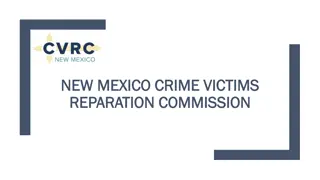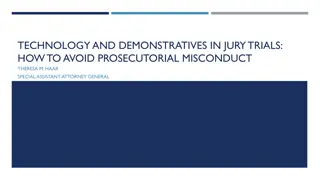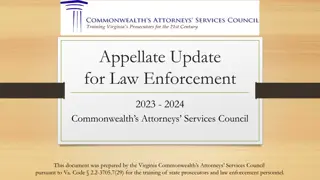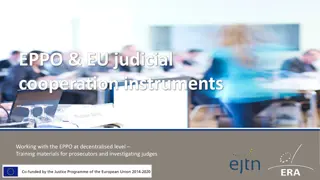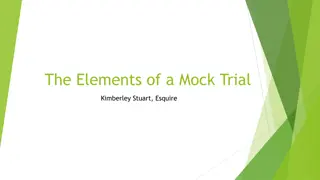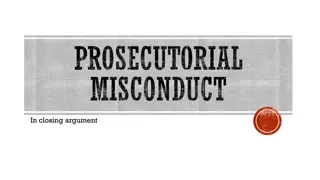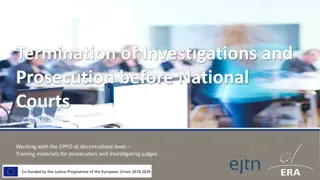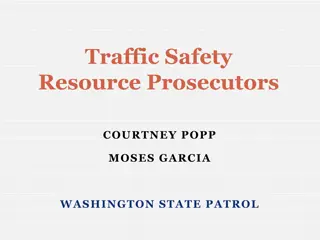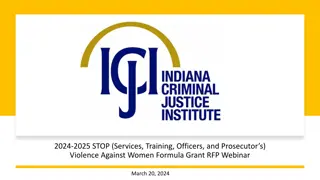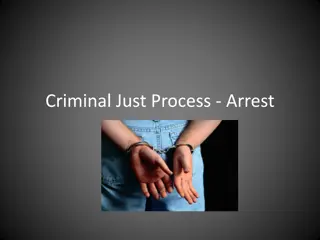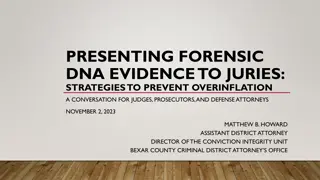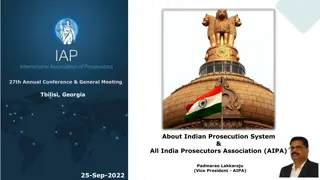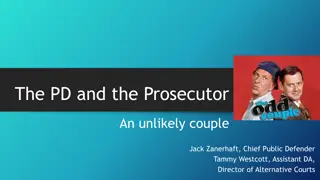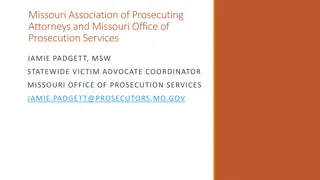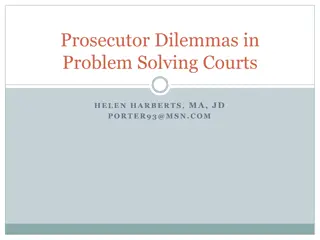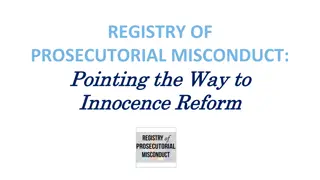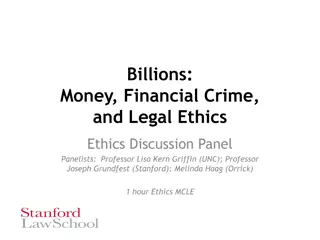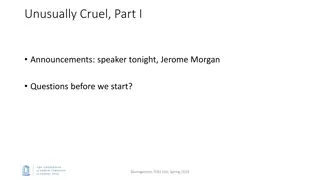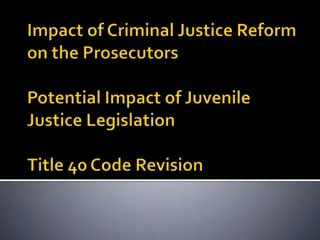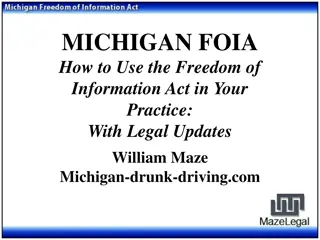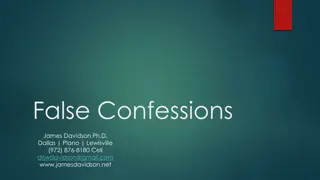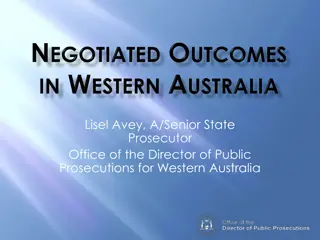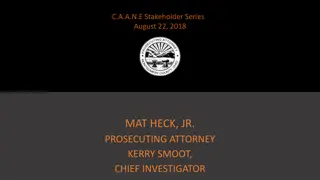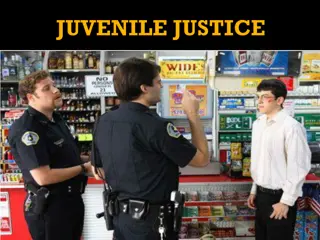Daniels Law Now: Protecting Covered Persons' Information
Daniels Law provides protections for covered individuals, including judicial officers, prosecutors, and law enforcement, along with their immediate family members. The law establishes a vetting process for registration and redaction of personal information to safeguard privacy. Redactors facilitate
0 views • 19 slides
Overview of Iowa Supreme Court Attorney Disciplinary Board
The Iowa Supreme Court Attorney Disciplinary Board oversees attorney misconduct cases in Iowa, with 4 prosecutors, a Director of Attorney Discipline, staff, and volunteer board members. Complaints can be made by anyone, commonly related to family law and criminal matters, with no statute of limitati
0 views • 34 slides
Assistance for Crime Victims in New Mexico
The Crime Victims Reparation Commission (CVRC) in New Mexico provides support to victims of violent crimes by covering related expenses and funding victim services organizations statewide. Emergency funds are available for survivors of sexual violence and human trafficking, with specific procedures
0 views • 20 slides
Technology and Demonstratives in Jury Trials: Avoiding Prosecutorial Misconduct
Understanding prosecutorial misconduct in jury trials is crucial to maintaining fairness in the legal system. This article highlights the responsibilities of a prosecutor, the impact of misconduct, and ways to prevent it using technology and demonstratives. By following ethical guidelines and ensuri
0 views • 88 slides
Appellate Update for Law Enforcement 2023-2024 Summary
The document prepared by the Virginia Commonwealth's Attorneys Services Council provides an overview of the 2023-2024 Appellate Update for Law Enforcement, covering topics such as criminal procedure, constitutional law, Virginia procedure, bail guidelines, domestic relations court jurisdiction, Four
0 views • 93 slides
EU Judicial Cooperation Instruments and EPPO: Working at Decentralised Level
The European Union's judicial cooperation instruments, including mutual recognition of judgments, form the basis for cooperation in criminal matters among Member States. The mechanisms outlined in various Council Framework Decisions and Directives emphasize mutual trust and compliance with EU law. T
0 views • 17 slides
Understanding Civil and Criminal Complaints in Legal Cases
Explore the distinctions between civil and criminal complaints in legal scenarios. Learn how a civil case seeks monetary damages while a criminal case pursues punishment for wrongful actions. Understand the roles of plaintiffs and prosecutors, burden of proof, and outcomes in both civil and criminal
0 views • 34 slides
Understanding Prosecutorial Misconduct in Closing Arguments
Explore the duty and obligations of prosecutors in presenting evidence fairly, the prevalence of prosecutorial misconduct, and the impact on legal proceedings. Learn about vouching, different types of prosecutorial misconduct in closing arguments, and key legal cases defining the boundaries of prose
5 views • 46 slides
Procedures for Concluding EPPO Investigations and Prosecutions
Explore the termination procedures in EPPO investigations before national courts, including bringing cases to judgment, dismissal, simplified prosecution, and referral. Learn about the decision-making processes, prosecution before national courts, and the powers of European Delegated Prosecutors. In
1 views • 19 slides
Enhancing Traffic Safety Through Prosecutor Partnerships
Traffic Safety Resource Prosecutors (TSRP) collaborate with law enforcement and traffic safety professionals to address impaired driving issues and promote road safety. They provide training, support organizations like the Washington Traffic Safety Commission and NHTSA, and aim to achieve zero death
0 views • 21 slides
STOP Violence Against Women Formula Grant Program Overview
The Services, Training, Officers, and Prosecutors (STOP) Violence Against Women Formula Grant Program provides support to communities in developing effective responses to victims of domestic violence, dating violence, sexual assault, and stalking. This grant program assists in addressing various for
0 views • 26 slides
Understanding the Criminal Justice Process: From Arrest to Warrant
Exploring the key steps in the criminal justice process, from the arrest of a suspect to the issuance of warrants based on probable cause. Learn about the legal procedures involved, including the role of prosecutors, defendants, judges, and law enforcement officers in ensuring justice is served.
0 views • 9 slides
Strategies for Presenting Forensic DNA Evidence Without Overinflating Importance
Presenting forensic DNA evidence to juries requires a balanced approach to prevent overinflation of importance. Early consultation with experts, adherence to Daubert Standard, addressing DNA contamination risks, and discussing statistical interpretation are crucial aspects to consider in ensuring a
0 views • 15 slides
Evolution of Indian Prosecution System and Current Structure
Evolution of the Indian prosecution system dates back to multiple eras, with changes in who could conduct prosecution in court. The present system includes Special Public Prosecutors and Cadre Prosecutors, appointed based on legal expertise and tenure. The hierarchy of courts assigns different prose
0 views • 10 slides
Transformative Collaboration in the Criminal Justice System
Embracing a non-adversarial approach, prosecutors and defense attorneys in alternative courts work collaboratively to support defendants through application, assessment, and completion. Prosecutors focus on public safety with a rehabilitative mindset, while defense attorneys prioritize client advoca
0 views • 26 slides
Missouri Association of Prosecuting Attorneys and Missouri Office of Prosecution Services Overview
The Missouri Association of Prosecuting Attorneys (MAPA) was established in 1969 with a goal to provide uniformity in the discharge of duties to Missouri's elected Prosecutors. The MAPA Board, comprised of current Elected Prosecutors, offers ongoing training throughout the year including conferences
2 views • 13 slides
Challenges and Innovations in Problem-Solving Courts
Helen Harberts, a skilled MA and JD with expertise in problem-solving courts, delves into the dilemmas faced by prosecutors in these courts. Through in-depth insights and thought-provoking questions, the narrative explores the effectiveness of traditional responses to addiction-based offenses, publi
0 views • 65 slides
Registry of Prosecutorial Misconduct: Pointing the Way to Innocence Reform
This registry, established in 2014, aims to promote awareness, ensure accountability, and evaluate policy reforms related to prosecutorial misconduct, highlighting the prevalence of wrongful convictions due to such misconduct. It serves as a mechanism to document cases of misconduct, provide data fo
0 views • 17 slides
Ethics in Prosecution: Balancing Justice and Duty
Delve into the complexities of prosecutorial ethics as explored in the TV series "Billions," discussing the duty of prosecutors to seek justice, ethical responsibilities outlined in the ABA Model Rule 3.8, and principles guiding federal prosecution. The narrative highlights challenges such as handli
0 views • 13 slides
Understanding the Criminal Justice System: Key Concepts and Practices
Explore essential aspects of the criminal justice system, including statistics on incarceration rates, plea bargaining dynamics, adversarial vs. inquisitorial systems, and differences between the US and UK. Delve into questions regarding high incarceration rates, the purpose of plea bargaining, and
0 views • 8 slides
Brady v. Maryland: The Case of Prosecutorial Misconduct
Brady v. Maryland was a landmark case where the defendant, Mr. Brady, was convicted of murder and sentenced to death. The case revolved around the prosecution's failure to disclose exculpatory evidence, violating Mr. Brady's due process rights. The Supreme Court held that prosecutors must share favo
0 views • 32 slides
Impact of Criminal Justice Reforms on State Courts and Prosecutors
Changes in crime classifications and sentencing laws, along with the emphasis on Accountability Courts, are reshaping the criminal justice landscape in the state. Key changes include alterations to theft, burglary, and controlled substance laws, impacting the workload of state courts and prosecutors
0 views • 20 slides
Legal Updates on Michigan FOIA, Brady v. Maryland, and Defense Counsel's Role
Explore legal topics such as the Michigan Freedom of Information Act, Brady v. Maryland, and the role of defense counsel in the legal system. Learn about the rights and obligations of prosecutors, defense attorneys, and law enforcement officers in ensuring fair trials and access to evidence.
0 views • 44 slides
Understanding False Confessions in the Criminal Justice System
False confessions are a concerning issue in the criminal justice system, leading to wrongful convictions and unjust outcomes. Various factors contribute to false confessions, including coercion, misinterpretation, and vulnerable demographics. The consequences of false confessions can be severe, impa
0 views • 24 slides
Understanding Charge Negotiations and Guilty Pleas in Court Proceedings
Charge negotiations and guilty pleas play crucial roles in criminal court proceedings. Through informal discussions, prosecutors and defense counsel determine appropriate charges and plea deals. A guilty plea entails accepting liability for all charge elements. Factors like evidence strength, public
0 views • 7 slides
Combating Elder Abuse in Montgomery County: Initiatives and Reporting Requirements
The Montgomery County Prosecutors Office, led by Mat Heck Jr., is actively combatting elder abuse through prosecuting various types of abuse like physical neglect and financial exploitation. Mandatory reporters have been expanded to include professionals like CPA's and investment advisors. A new law
0 views • 23 slides
Survey Development and Timeline for Data Committee Meeting
Summary: The content outlines the survey development process for the TREC Survey and Model Policy Project, involving stakeholders like law enforcement and prosecutors. It includes drafting survey questions, finalizing assignments, sending surveys, and follow-up timelines for data collection and anal
0 views • 10 slides
Promoting Juvenile Welfare and Community Protection
This legal document aims to ensure the care, protection, and holistic development of children while safeguarding the community and preventing unlawful behavior by minors. It outlines the roles of various court officials, prosecutors, and the process for handling juvenile and adult cases.
0 views • 26 slides


